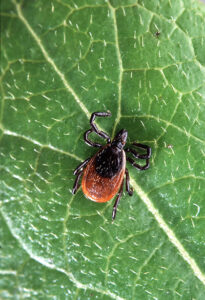Results released from the 2021 Maine Forest Tick Survey

Allison Gardner, assistant professor of arthropod vector biology and Mitchell Center Faculty Fellow, is the principal investigator of the Maine Forest Tick Survey, a multiyear, multidisciplinary project examining the link between forest land management and ticks.
Recently announced 2021 study results indicate that nine southern and coastal Maine counties had a three-fold increase in ticks in 2021 compared to the same time the year before. The survey results are available online.
The survey also revealed patterns in the distribution of ticks in the forest landscape. Properties that had timber harvests in the past 15 years had significantly fewer blacklegged tick nymphs than those that have not been harvested in 20 or more years. Properties that had invasive plants had significantly more blacklegged tick nymphs than properties without, particularly those with barberry and honeysuckle.
“These findings complement a growing body of literature that suggests that land management history can dramatically alter the distribution and infection prevalence of disease vector tick species,” says Gardner.
